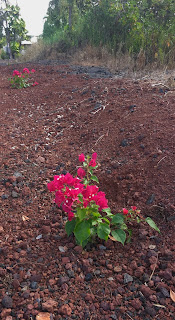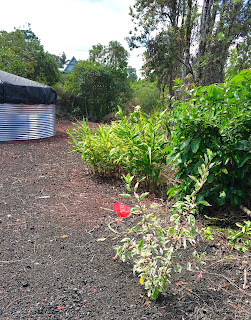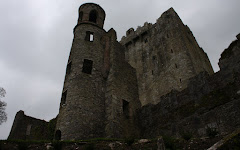Almost thirty years ago my mom died rather unexpectedly after a short illness. Less than a year before her death, I had moved overseas to teach school on a US military base in Germany. Although I was blessed to be able to spend several days with her before she passed, I returned to Germany a few days after the funeral and did not directly participate in the division and distribution of my mom’s stuff--all those material possessions we collect unto ourselves over a lifetime. Nevertheless, my dad and five siblings designated certain items for me, and eventually they all arrived at my overseas household. For almost three decades they then accompanied me through eight moves across four countries and three continents. Now, as I unpack myself into my new home, I have had the chance to more mindfully reflect on some of these things she left behind.
For whatever reason, I received the primary pieces my mom deemed essential to carry in her purse: black leather gloves, a collapsible cup, a comb, and her wallet (sans any money, mind you).
Black Leather Gloves. My mom died in the winter, toward the end of February actually, and in Utah cold days come with winter, some of them bitterly so. In all my memories, her winter gloves of choice were black leather--a preference that offered warmth with a certain elegance and a good grip on a steering wheel. In my mind’s eye I can still replay her putting on black leather gloves, taking off black leather gloves, and her hands resting on a steering wheel sheathed in black leather gloves. Twice while living in Asia I rescued that final pair of black leather gloves from marauding mold, yet now I’ve entirely surrendered them to oblivion because I finally had a plan to make them part of a written record. I only wish I had taken a photo of them first.
Collapsible Cup. Even before I left for Europe, my mom carried that collapsible cup in her purse. When I first uncovered it in her purse (she had tasked me with finding something for her from her purse, lest you wonder at my motives), I had a good giggle and teased her about it. She insisted that while on the go it made taking a pill--usually an aspirin, in her case--so much easier than trying to swallow one down while sucking water from a drinking fountain. And back in those days, by the way, she would never have considered buying a bottle of water. The thought of my mom drinking from that collapsible cup still makes me smile. Sometimes I wonder if she ever imbibed her favorite guilty pleasure--that would be Mountain Dew--from that cup since she only ever drank Mountain Dew when out and about on her road trips and never in the presence of her family. (She forgot to discard the visible empties from the car one time and then ruefully confessed in rather flustered embarrassment when questioned; her one-time secret became part of favorite family lore: Mama drinks when she drives--Mountain Dew, that is.)
A Comb. Small, white, and with one tooth broken off. I wonder why she didn’t replace it, but I also know the answer: It still performed its purpose satisfactorily, so, in her mind, no need for replacement really yet existed.
Her Wallet. Certainly not a new wallet at the the time of her passing, and now thirty-plus years later of existence (in addition to enduring twelve of those years in the thick, heavy humidity of Asian summers), its faux leather exterior began to crumble in my hands as one more time I explored the items enclosed, all of them--sans any money, as previously noted--still situated in their assigned slots and compartments:
Membership card for the Daughters of the Utah Pioneers. My mother was an avid quilter and active in quilting groups as both a teacher and an organizer. When I asked her why she wanted to be a member of the Daughters of the Utah Pioneers, her angle was quilting--access to historical quilts and the chance to promote quilting in general. I believe she also became a member of the Daughters of the American Revolution for the same reasons, but there was no membership card for that organization in her wallet.
TWO library cards, one for the Salt Lake County Library System and one for the Salt Lake City Public Library. Yes, my mom liked to read. She read lots and lots--books and magazines and newspapers. Even when the family went on vacation, my mom would not let my dad suspend newspaper delivery because she wanted access to those newspapers when we returned. We moved multiple times as I was growing up--Utah, Colorado, New Jersey--and one of the first things we did after establishing a new residence was head to the nearest public library to get library cards.
Poetry clippings.(2) I love poetry; in fact, I am one of those people who actually owns poetry books and reads them. My passion first flamed in high school, and I remember one time I wanted to discuss with my mom some of the poetry we were studying in my high school English class. She read one and then looked at me and said, “Evelyn, poetry isn’t really my thing and I don’t understand it very well.” And then she didn’t want to discuss the poems with me. That surprised me because she had read poetry to us all through my childhood. So, for a decade or so, I just loved poetry on my own. But since the discovery of poetry in my mom’s wallet, poetry kept with her and close at hand, I think my mom had a relationship with poetry after all.
A photograph of her first grandchild--Justin. At the time of her death, my mother had not been a grandma very long. She loved being a grandmother, and one of her voiced regrets before her passing was that she wouldn’t have more time being a grandma. She now has seventeen grandchildren and twenty-one (if I counted correctly) great-grandchildren.
I have other things she left behind as do my brothers and sisters. Perhaps they have become a flicker of light within the hazy mess of memory or maybe the piece of an illustration for the stories we need to write.
---------------------------------------------------------------
(1)
Handwritten notes written on the back of the paper insert in the packaging of an emergency poncho:
Hope - expect tomorrow to be better
Optimism - habit of hoping
Faith - hope against great odds
“He who has a why to live for can bear almost any how.”
(Friedrich Nietzsche)
“Your mood has a direct effect on which information you bring to mind in a judgment.”
(Dr. Gordon Bower, Stanford)
A winner expects to keep on winning, a loser, losing.
10 Techniques of Hope
1. Find your own silver lining. After lose, think of what is left.
2. Avoid self-pity.
3. Learn to laugh.
4. Borrow hope from others. (Parenthetical notation I can’t read for sure but looks like “Base of A.A.”)
5. Broaden your options.
6. Take charge.
7. Practice daydreaming.
8. Use denial to cushion despair--for a short while.
9. Avoid global thinking--one day at a time.
10. Don’t panic.
(2)
The Atlantic Monthly, March 1984, “Whiplash,” by William Matthews
Whiplash
That month he was broke,
so when the brakes to his car
went sloshy, he let them go.
Next month his mother came
to visit, and out they went
to gawk, to shop, to have something
to do while they talked besides
sitting down like a seminar
to talk. One day soon he'd fix
the brakes, or–as he joked
after nearly bashing a cab
and skidding widdershins
through the intersection
of Viewcrest and Edgecliff–
they'd fix him, one of these
oncoming days. We like
to explain our lives to ourselves,
so many of our fictions
are about causality–chess
problems (where the ?! after
White's 16th move marks
the beginning of disaster),
insurance policies, box scores,
psychotherapy ("Were your
needs being met in this
relationship?"), readers' guides
to pity and terror–, and about
the possibility that because
aging is relentless, logic too
runs straight and one way only.
By this hope to know how
our disasters almost shatter us,
it would make sense to say
the accident he drove into
the day after his mother left
began the month he was broke.
Though why was he broke?
Because of decisions he'd made
the month before to balance
decisions the month before that,
and so on all the way back
to birth and beyond, for his
mother and father brought
to his life the luck of theirs.
And so when his car one slick day
oversped its dwindling ability
to stop itself and smacked two
parked cars and lightly kissed
another, like a satisfying
billiards shot, and all this action
(so slow in compression and
preparation) exploded so quickly,
it seemed not that his whole life
swam or skidded before him,
but that his whole life was behind
him, like a physical force,
the way a dinosaur's body
was behind its brain and the news
surged up and down its vast
and clumsy spine like an early
version of the blues; indeed,
indeed, what might he do
but sing, as if to remind himself
by the power of anthem that the body's
disparate and selfish provinces
are connected. And that's how
the police found him, full-throated,
dried blood on his white suit
as if he'd been caught in a rust-
storm, song running back and forth
along his hurt body like the action
of a wave, which is not water,
strictly speaking, but a force
that water welcomes and displays.
--William Matthews
July 1958, R.S. Magazine, p. 443
With You Away
I thought I could not bear to view
The yellow daffodils,
Nor watch the early grass of spring
Make green the rain-black hills.
I thought my heart would break when blooms
Were on the apple tree,
With sunlight dappled underneath
And you not here to see.
I thought the rose and violet
Would put my peace to rout;
That I would have to seal my room
To keep their perfume out.
But I was so prepared for these,
Had such a courage gained,
That they had come and gone and still
My fortitude remained.
Until about an hour ago,
When near the west porch wall,
I found the treasured knife you lost
While pruning vines last fall.
--Enola Chamberlin
From Paradise Lost, bk. V., lines 507-540, John Milton
[Adam and Eve discuss “obedience” with their heavenly visitor to the Garden, the Angel Raphael.]
Adam says to Raphael:
O favourable spirit, propitious guest,
Well hast thou taught the way that might direct
Our knowledge, and the scale of Nature set
From centre to circumference, whereon
In contemplation of created things
By steps we may ascend to God. But say,
What meant that caution joind, if ye be found
Obedient? can wee want obedience then
To him, or possibly his love desert
Who formd us from the dust, and plac’d us here
Full to the utmost measure of what bliss
Human desires can seek or apprehend?
To whom the Angel. Son of Heav’n and Earth,
Attend: that thou are happie, owe to God;
That thou continu’st such, owe to thy self,
That is, to thy obedience; therein stand.
This was the caution giv’n thee; be advis’d.
God made thee perfet, not immutable;
And good he made thee, but to persevere
He left it in thy power, ordaind thy will
By nature free, not over-rul’d by Fate
Inextricable, or strict necessity;
Our voluntarie service he requires,
Not our necessitated, such with him
Findes no acceptance, nor can find, for how
Can hearts, not free, be tri’d whether they serve
Willing or no, who will but what they must
By Destinie, and can no other choose?
My self and all th’ Angelic Host that stand
In sight of God enthron’d, our happie state
Hold, as you yours, while our obedience holds;
On other surety non; freely we serve
Because wee freely love, as in our will
To love or not; in this we stand or fall:














































